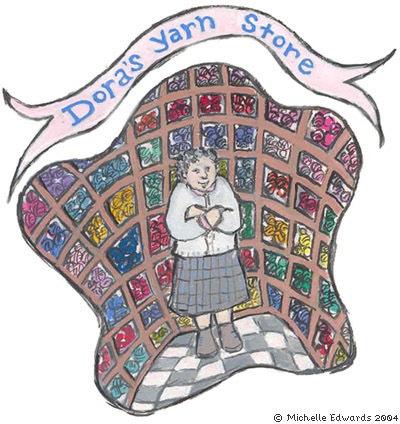 In
1972, I started college in Albany, New York.
I was in a special program, a college within
a university. On Thursdays, we all met for
integration, a full afternoon of lectures
and discussions. Integration was
a great time to knit away on a scarf or
hat or even an afghan. And if I happened
to be out of yarn, integration was
an excellent time to skip out and shop for
more. That is how I discovered Dora's Yarn
Store.
In
1972, I started college in Albany, New York.
I was in a special program, a college within
a university. On Thursdays, we all met for
integration, a full afternoon of lectures
and discussions. Integration was
a great time to knit away on a scarf or
hat or even an afghan. And if I happened
to be out of yarn, integration was
an excellent time to skip out and shop for
more. That is how I discovered Dora's Yarn
Store.
When I close my eyes and
recall Dora's Yarn Store, I see the color
gray: gray sidewalk, gray door, gray dusty
windows and a gray-haired Dora wearing an
old gray cardigan. She was no more than
5 feet tall, but with her step stool, she
knew how to reach all the nooks and crannies
of her little shop with its floor to ceiling
cubbies filled with yarn.
I started making my way
down to Dora's to buy yarn and to escape
from college life. I loved being surrounded
by the quiet and familiar warmth of a yarn
store and the comforting presence of Dora,
who was always the only person working there.
I brought my friends to
Dora's, too. And that is how I came to be
Dora's courier. My friend Roberta, who by
then was also a Dora's customer, bought
some cotton yarn. She told Dora she was
making me a crocheted travel bag for my
upcoming trip to Israel.
Dora asked to see me before
I left. Could I bring some yarn to her sister-in-law
who lived in Jerusalem? Bringing gifts to
friends and relatives, items hard to find
or expensive to purchase, was a very common
request of travelers to Israel back then.
And it was one that was always honored.
Dora carefully chose four skeins of dark
blue wool and gave them to me with her sister-in-law's
address.
A friend helped me find
Dora's sister- in-law's elegant apartment
in the wealthy Jerusalem neighborhood of
Rehavia. Dora's sister-in-law showed us
pictures of her husband with Ben Gurion
and Golda Meir. She told us that her son
or husband or nephew, I can't remember which,
had translated Darwin into Hebrew. What
a family, I thought.
As I listened to these
stories of Dora's family's accomplishments,
I knew that I couldn't leave without asking.
Nicely, I hope. Why? Why did Dora
have a shop in the decaying downtown of
Albany, New York when she could spend her
days in Jerusalem with her family, rubbing
shoulders with the elite? She could even
have a yarn store in a charming neighborhood
like Rehavia.
The answer Dora's sister-in-law
gave wasn't really an answer. It seemed
to me then it was story, a sad, familiar
story about the eldest daughter in a very
traditional family. She goes to America,
works hard and opens a yarn store. She sends
the money her family needs, first to Europe,
then, to Israel. The family survives and
prospers because of her hard work. Their
success is her enjoyment. Now old and settled
in her ways, her yarn store is her home.
When Dora's sister-in-law
finished her story, I knew my visit was
almost over. I reached into my already
travel-worn travel bag and pulled out the
four skeins of navy blue wool.
Dora's sister-in-law was
an educated, wealthy and well-connected
woman. On that cold Jerusalem evening, she
wore a beautifully tailored tweed suit and
served us tea and cookies on fine china.
It was hard for me to believe that this
woman would need or want such plain and
ordinary yarn. But she was gracious. She
admired the wool and thanked me for delivering
it.
As I stood to leave, Dora's
sister-in-law held my arm for a moment.
"I once went
with Dora on a buying trip to Chicago,"
she told me. "Everywhere we went, people
knew Dora. She is very knowledgeable about
knitting and yarns. When she talked, they
listened."
As I moved around the
next few years trying to find my way in
the world, I always tried to stop by and
visit Dora when I was in Albany. She was
old when I first met her, but on my last
visit she seemed so much smaller and grayer
and older. When she died, I was back in
Israel, studying art in Jerusalem.
Now that I am a middle-aged
mother living in Iowa with my husband and
three daughters, I realize the how the choices
we make often change our lives. Now I understand
why Dora didn't move to Jerusalem and bask
in her family's accomplishments. Now I understand
how satisfying it must have been for her
to be an independent woman, to have worked
hard and helped her far-flung family succeed,
to have her own store filled with beautiful
yarns, to be respected for her knowledge
of knitting and yarns and perhaps with a
cup of good strong coffee in her hand, to
have been able look out her shop window
every morning with a sense of fulfillment
to the sign that read "Dora's Yarn
Store."

